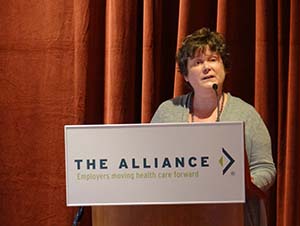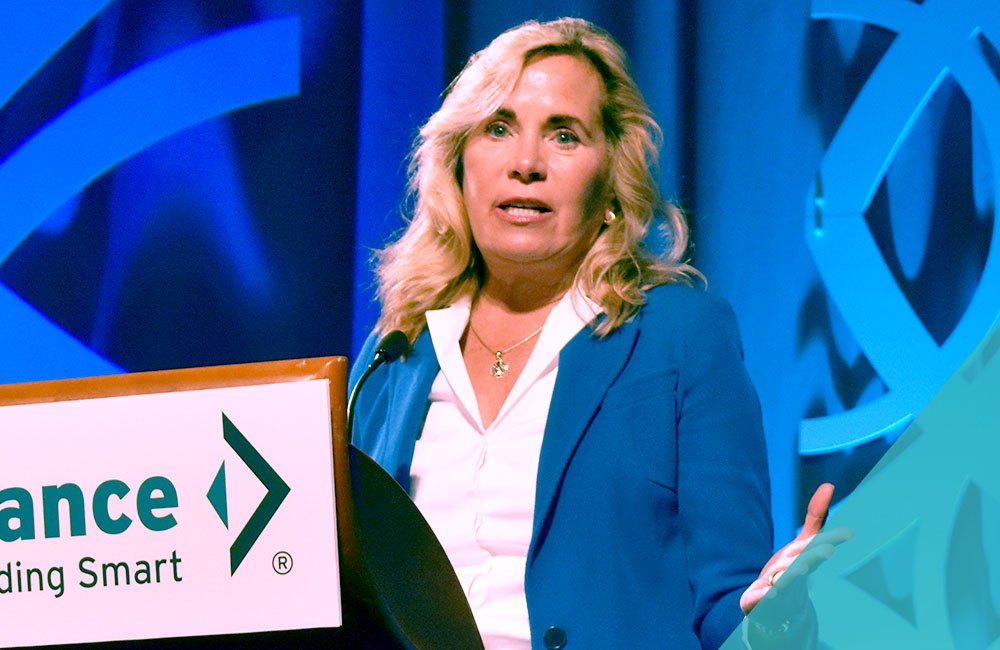
Cancer in the Workplace: An Employer’s Perspective
Cancer is typically one of the highest-cost conditions for an employer’s health plan. So it’s best to be prepared and have supportive resources ready when an employee says, “I have cancer.”
Lynn Zonakis, former managing director of health strategy and resources for Delta Air Lines, shared the story of creating Delta’s cancer benefits and resources guide at The Alliance Learning Circle “Cancer in the Workplace: Current Cancer Care Issues for Employers” on March 15, 2016.
While creating a cancer guide is a major task, it can have significant benefits for both employers and employees.
Watch Lynn’s presentation from our March event below:
Cancer in the Workplace – Where do I start?
“Take a look at your company’s culture,” Zonakis suggested.
Delta highly values customer service in all sections of their organization. As an employer, Delta’s frontline customers are its own employees. The value of customer service steered the creation of Delta’s cancer benefits and resource guide.
“If you treat your employees well, that behavior will transfer into other parts of the company,” Zonakis said.
Company’s Cancer Statistics are Startling
Delta Air Lines has over 80,000 employees and over 150,000 lives covered under its benefits plan. The average age of an employee is 49.
Within this population, cancer was found to be:
- Always within the top two conditions for health care claims in trend and highest cost.
- Approximately 25 percent of high cost claimant expense.
- Approximately 16 percent of the total cost of annual claims.
- Over 15 percent of total pharmacy cost and climbing towards 20 percent.
- Led in Delta’s population by breast cancer.
These startling statistics put Delta on the path to designing its own cancer benefits and resource guide. The aim was to create a culture of health by providing value throughout the care continuum for employees and family members with cancer.
What did Delta learn from designing its guide?
“While it sounds counter-intuitive with a life-threatening condition like cancer, many people aren’t fully compliant with taking their cancer medications. Oftentimes it is due to high cost of drugs or treatment, but other times non-compliance can be a result of side effects, cultural attitudes or any number of factors,” Zonakis said. “Therefore, it is important for the employer to systematically look at these causes and address them as best they can.”
Delta put in place a reasonable out-of-pocket threshold so that cost is not a significant barrier for patients to obtain their medications. Delta also encourages and provides support to the patient to access affordable, evidence-based cancer treatment whether in the community or at a Center of Excellence for cancer treatment. When travel is required to access a second opinion or treatment at a Center of Excellence, the Delta benefit provides a travel/lodging benefit and enhanced co-insurance for these facilities.
Cancer Nurse Advocates were added to empower cancer patients with information on evidence-based methods in cancer treatment, symptom management and utilization of palliative care services. Patients greatly appreciated this service, along with psychosocial and work/life support.
“Palliative care is critical for any cancer program,” Zonakis said. “People make better decisions when they feel comfortable and have better quality of life. Palliative care should not be limited to end of life. It is highly effective for symptom relief and has been shown to assist with better outcomes.”
Communication is Key
In 2012, Delta revised its communications program to include targeted communications focused on an individual’s gender, age and health risk assessment results.
“You will have greater participation in programs if you make that communication more meaningful for the participant. Therefore, we provide messaging not only on a group level, but a targeted, individual level,” Zonakis said. “However, managing cancer starts with prevention and early detection. Prevention is really at the heart of Delta’s health communications plan.”
“And keep it simple,” suggested Zonakis, “Delta provides one toll-free 800 phone number for employees and their families to call with any health concern.”
All managers at Delta receive training on what is available and how to direct employees to these resources when the need arises.
Measuring Results
Delta started the cancer management program in 2006. Measuring cancer cost trends has been difficult. But it has been just as difficult to measure the increase in quality of life within the employee population.
“Focus on things that you can monitor and easily quantify,” Zonakis said, “such as hospital readmission trends and drug interaction trends.”
Being prepared is advisable for an employer of any size. You never know when that tomorrow may come and an employee steps forward to say, “I have cancer.” Be prepared to assist them on their journey.
[box]
Learn More about Cancer in the Workplace
- Comparing Your Options for Colorectal Cancer Screening
- Cancer Resources for Employers.
- Download a copy of Zonakis’ presentation.. External Link. Opens in new window..
[/box]







